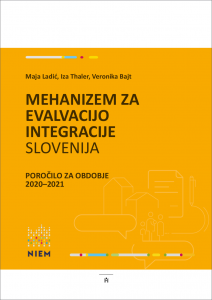
Third National Report on Slovenia’s implementation of different areas of integration policy for beneficiaries of international protection
We are pleased to present the third National Report on Slovenia’s implementation of different areas of integration policy for beneficiaries of international protection. The research, carried out in 2020 and 2021, comprised more than 180 indicators aimed at diagnosing the current situation in the field of integration of refugees in Slovenia. These indicators measure or evaluate different types of data, encompassing legal, administrative, statistical, financial, etc. data in practically all areas of integration – from residence, citizenship, family reunification, education, employment, vocational training, health, social protection, access to housing, language learning, social orientation, to building bridges with the local population. The third and final research carried out in the NIEM project covers the time period between 1 January 2020 and 31 March 2021.
In the third evaluation of the integration of beneficiaries of international protection in Slovenia under NIEM, we found that in most areas the situation has remained the same as three years ago, whereas in some areas it has worsened. With regard to the indicators measured, we did not find a systemic improvement in any of the areas.
The main issues remained the same throughout the evaluation period and were largely unaddressed:
Access to housing (too expensive, discrimination, racism, etc.);
Access to health services (lack of family doctors, especially in the capital);
Employment issues (refugees report that they receive the same job offers regardless of their education or experience);
Language barrier (although refugees are entitled to a 400-hour free language course, the results in practice are poor and most refugees rate the way the course is delivered as inadequate).
In addition to the above problems, some of which also affect the local population in Slovenia, beneficiaries of international protection additionally face discrimination, social exclusion and poverty, as well as psychological and physical problems due to the situation in their country of origin, pushbacks and other often violent experiences both on the move and in Europe, e.g. during the asylum process – these problems remain largely unaddressed and in the long term prevent successful integration.
There is also a pronounced gap between existing legislation and policies on the one hand, and the implementation and cooperation of stakeholders on the other. In practice, integration is not understood as a two-way process, but rather as a process of assimilation of the individual. Integration is still fully centralised and the local level is not involved.
Despite many obstacles and an often hostile environment, especially in bureaucratic procedures, persons granted international protection still manage to navigate the system somehow, albeit mainly with the indispensable help of NGOs, activists and some civil servants who, despite the shortcomings of the system, make a special effort to help someone.
But the above problems, obstacles and challenges are solvable! By listening to the problems of beneficiaries of international protection and migrants, by keeping an open mind, by taking into account the experts and organisations that have been providing support and solving problems for years, by involving and addressing the local population, and by systematising the good practices of pilot projects, we can make significant progress in the field of integration of beneficiaries of international protection in Slovenia. We all have (or should have) a common goal: to improve the integration and inclusion of foreigners into Slovenian society and thus create a welcoming and functional social sphere for both the local population and the immigrants. Where there is a will, there is a way!
The NIEM research and advocacy project, which aims to measure/evaluate and improve integration policies for persons granted international protection, has been implemented since 2015, together with partners in 14 countries of the European Union. We have carried out three periods of research, focusing on 2016, 2018 and 2020-21.
The Benchmark Report on Refugee Integration was published in May 2022. It showed that the countries receiving the most Ukrainian refugees are the least prepared.
